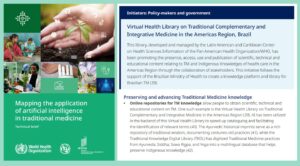A recent publication by the World Health Organization (WHO), in partnership with the International Telecommunication Union (ITU) and the World Intellectual Property Organization (WIPO), highlights the emerging use of artificial intelligence (AI) in traditional health practices around the world. Entitled “Mapping the application of artificial intelligence in traditional medicine: technical brief” (July 11, 2025), the document recognizes the contribution of BIREME/PAHO/WHO by mentioning the Virtual Health Library on Traditional, Complementary, and Integrative Medicines in the Americas (TCIM Americas VHL) as a reference for the application of AI aimed at the management and dissemination of technical and scientific knowledge in the area.
Developed and coordinated by BIREME with support from the Brazilian Ministry of Health and the TCIM Americas Network, TCIM Americas VHL is a regional platform that brings together scientific, educational, and technical content on traditional and integrative health practices, such as Ayurveda, herbal medicine, traditional Chinese medicine, indigenous practices, among others. According to the new WHO document, the use of AI in the library has been used to speed up the bibliographic description process and facilitate the identification of relevant terms, contributing to the improvement of information organization and retrieval.
Regional model for innovation in digital libraries
BIREME has updated its institutional mission based on technological innovation and digital transformation, as defined in its 2023-2025 Strategy. The virtual libraries developed through the Center’s technical cooperation have used AI-based tools and methodologies such as DeCS and LILACS flows to expand the reach and usability of traditional health knowledge, which has been a hallmark of BIREME throughout its history.
The mention of BIREME in the WHO technical publication comes amid a series of institutional initiatives that have been promoting the responsible and ethical use of artificial intelligence in the context of public health and traditional medicines, such as the series of explanatory webinars on the topic, held under the Program for Strengthening Health Information Networks in Latin America and the Caribbean. In 2025, BIREME actively participated in the Regional Consultation for Prioritizing Research in TCIM promoted by PAHO and in the construction of the WHO Traditional Medicine Global Library, also cited as a reference in the document.
AI as an ally for equity in access to information
The WHO technical publication draws attention to the potential of AI in advancing traditional health practices — especially in preserving ancestral knowledge, expanding access to information, supporting clinical decision-making, and designing evidence-based public policies. At the same time, it warns of challenges such as complying with data sovereignty, protection against biopiracy, and strengthening digital infrastructure in low- and middle-income countries.
BIREME’s experience with the TCIM Americas VHL shows that it is possible to integrate technological innovation and the valuing of traditional knowledge in an ethical, sustainable, and collaborative manner, in line with the guidelines of the WHO Strategy for TCIM and the principles of digital transformation of health systems.
Other BIREME initiatives with AI for traditional medicine
Besides the TCIM Americas VHL, other initiatives coordinated by BIREME have also been applying artificial intelligence to the management and dissemination of knowledge about traditional medicines. Among them, the Center’s work in developing and curating the WHO Traditional Medicine Global Library (TMGL) stands out.
In the first half of 2025, TMGL implemented TMGL GPT Modeler, an AI-based conversational assistant that is already incorporated into the platform’s homepage. This deliverable directly responds to TMGL’s fundamental purpose: to offer an innovative digital environment that preserves, values, and articulates traditional, complementary, indigenous, and ancestral knowledge into global public health.
According to Mirelys Puerta Díaz, BIREME librarian and TMGL manager, the implementation of the GPT assistant reflects the product’s commitment to education, accessibility, and multi-epistemic dialogue, allowing users to explore complex content with natural language support in an intuitive way, without interrupting their navigation on the platform.
The initiative, conceptualized and coordinated by BIREME Director João Paulo Souza, was integrated last May with a focus on usability, digital inclusion, and alignment with the WHO Global Traditional Medicine Strategy 2025-2034 and the Gujarat Declaration. The resource contributes to transforming TMGL into a digital meeting point between knowledge systems, supporting policymakers, researchers, health professionals and communities.
At the same time, during the last semester, the automated generation of thematic Super Abstracts of bibliographic records was consolidated under the technical leadership of Francisco Barbosa Junior, BIREME’s Artificial Intelligence specialist. Currently, 677 records with Super Abstracts from the LILACS and TCIM databases are available, accessible via TMGL’s “integrated search interface” (IAHx) application. This functionality accelerates and improves the search and understanding of complex content in traditional health, contributing to a more intelligent TMGL that is accessible and meets the user’s needs.
